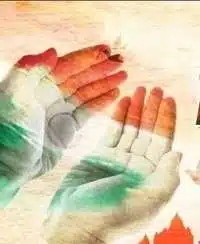
Independence
Read the passages given below and answer the questions that follow them:
1. India has stood for freedom. Even before Independence, we viewed our own struggle and difficulties on the larger canvas of global problems. If democracy is basically tolerance for others’ opinions, the concept of coexistence is democracy on the international plane, for it embodies tolerance of other nations and systems. Similarly, non-alignment gives depth to our independence and self-reliance for it enables us to retain our freedom of judgement and action on international issues in the light of our national interests. We avoid involvement in the conflicts and disputes of others and this helps to blunt conflict between power blocs. I should like to think that it has also helped world stability.
2. A country is an extended family. When income and resources are limited, one must budget to ensure that waste is avoided, resources husbanded, priorities established, education and other social needs catered to, special provision made for those who are weaker or smaller. The industry has to be balanced with agriculture; technology with culture; state ventures with private initiative; economic growth with social justice; the large with the small. Every section of society must be stimulated to creative activity.
3. That is our planning. In no way is it totalitarian or coercive. Industrializing, modernizing and transforming an ancient society of immense size, population and diversity is a daunting venture and inevitably, a gradual one. Otherwise, there will be resentment. Transformation should not cause too much dislocation or suffer for the people nor should it jettison the basic spiritual and cultural values of our civilization.
4. India’s planning experience sums up the successes and problems of our democratic development. The magnitude and significance of democracy’s operation in India are not well understood, for it is often treated as an adventitious or borrowed growth. Why has democracy worked in India? Our national leadership was dedicated to it and we wanted it to work, but, also, because in our society there were elements and traditions which supported the growth of democracy.
Word-Meaning: Canvas—perspective, Global—of the world, Concept—basic idea, Co-existence—living together, Embodies—includes, Retain—maintain, Issues—problems, Conflicts—disputes, Resources—means, Husbanded—managed, Provision—arrangement, Ventures—(here) works, Initiative—first performance, Stimulated—aroused, Totalitarian—dictatorial, Coercive—governed by force, Transforming—changing, Inevitably—unavoidably, Resentment—anger, Dislocation—displacement, Jettison—throw away, Magnitude—size, Adventitious—accidental, Dedicated—devoted to,
Attempt any eight of the following questions on the basis of the passage you have read.
1. How did India view its own struggle even before independence?
2. What does democracy mean on the international plane?
3. How does non-alignment give depth to our independence?
4. How does non-alignment help world stability?
5. What priorities should we ensure in budgeting our resources?
6. How can we balance different things to create and stimulate activity?
7. What should we do to have a smooth transformation?
8. Why has democracy worked in India?
9. Find a word in paragraph 3 which is similar in meaning to ‘anger’.
Answers
1. India viewed its own struggles and difficulties on the larger canvas of global problems.
2. On the international plane, democracy means tolerance of other nations and systems. The concept of co-existence is the central issue.
3. Non-alignment gives depth to our independence and self-reliance. It enables us to retain our freedom of judgement and action on international issues in light of our national interests.
4. Non-alignment avoids involvement in conflicts between power blocks and helps world stability.
5. We should avoid wastage, husband resources, establish priorities and cater to education and social needs.
6. The industry has to be balanced with agriculture. Technology with culture and state ventures have to be balanced with private initiative. Economic growth has to be balanced with social justice and the large with the small to stimulate creative activity.
7. Transformation should not cause too much dislocation or suffer for the people. It should not affect our basic spiritual and cultural values.
8. Democracy has worked in India due to the devotion of the leadership and the people to work. There were elements and traditions in our society that supported the growth of democracy.
9. Resentment.
Download the above Passage Worksheet in PDF (Printable)
More Comprehension Pasages:-
Passage -41 Story Of An Innocent Boy (350 Words Subjective Solved)
Passage -42 POWER FOODS (337 words Subjective Solved)
Passage-43 THE STORY OF MILTON HERSHEY (350 Words Subjective Solved)
Passage-44 SPOILED CHILD (350 Words Subjective Solved)
Passage-45 SNAKE (400 Words Subjective Solved)
Passage-46 TRADITIONS AND MEMORIES (350 Words Subjective Solved )
Passage-47 The Art Of Biography Writing Owes It To Gossip (400 Words Subjective Solved)
Passage-48 FEEBLE VOICE (400 Words Subjective Solved)
Passage-49 SUBRAMANIA BHARTI (400 Words Subjective Solved)
Passage-50 JOURNEY (350 Words Subjective/Objective Solved)